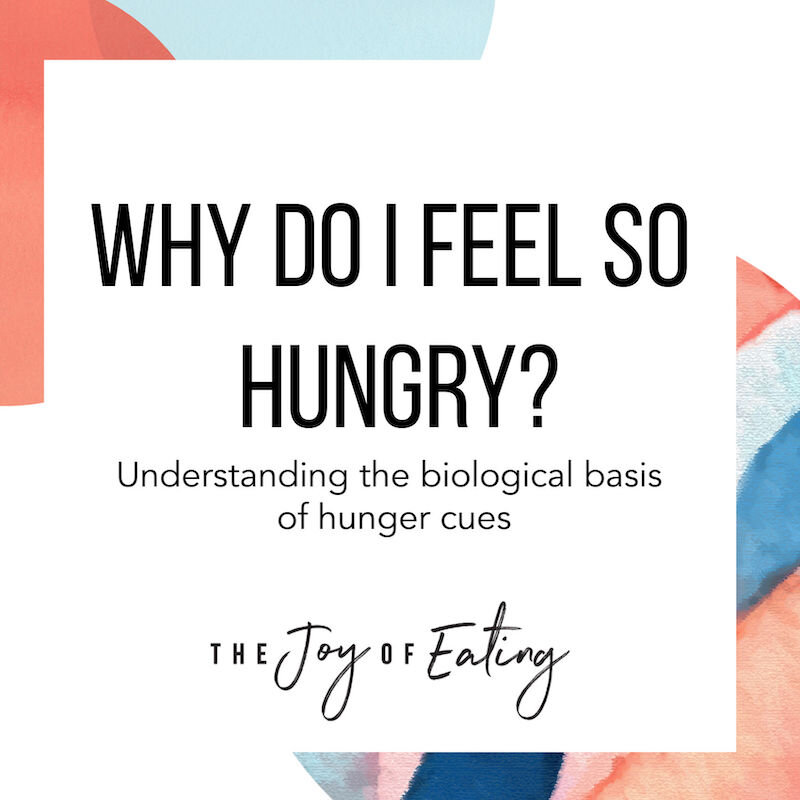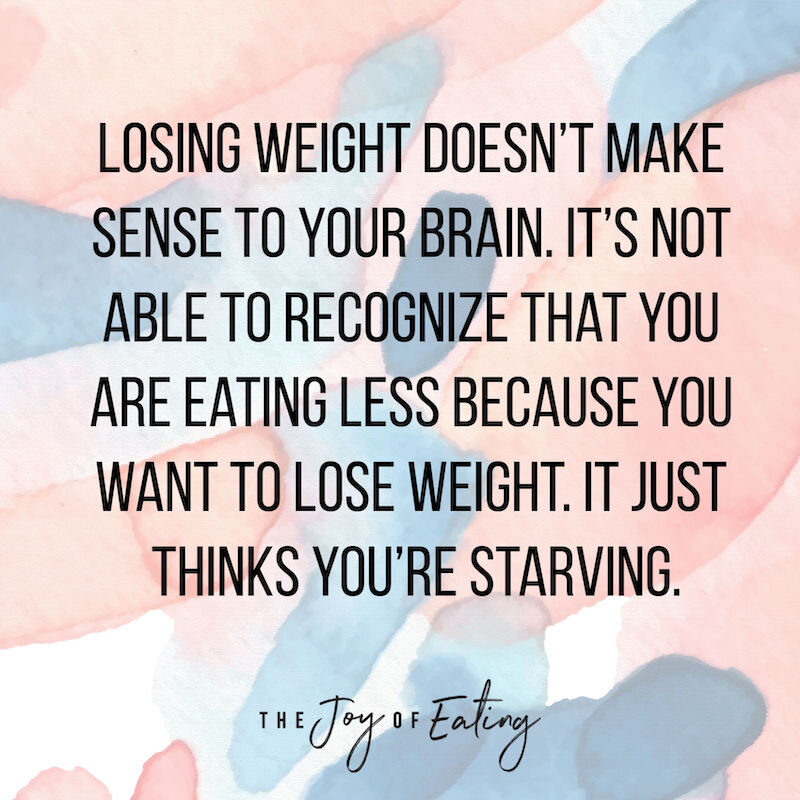Why Do I Feel Hungry? Understanding Hunger Cues in Intuitive Eating
If you’re someone who has tried to diet, only to have your plan foiled by intense hunger cues, you might be wondering why do I feel so hungry when I’m trying to stick to a diet? This post discusses the biological basis of how hunger cues work, and how intuitive eating can help normalize your hunger cues so you’re able to feed yourself adequately and appropriately throughout the day.
A couple weeks ago I had a lovely Winthrop dietetics masters student complete a rotation with me. I was SO impressed with her smarts and passion for non-diet nutrition. One of her assignments was writing this post and I’m so thrilled to share it with you all! Connect with Bailey on instagram and keep up with her adventures as she soon becomes a dietitian!
As a dietetic intern, I’ve spent a lot of time observing nutrition counseling with clients who all express a similar concern - they want to lose weight. These clients have spent a good part of their adult lives trying to change their body size by eating less and working out more without sustainable success. And each time, they find themselves in the same cycle: restrict, experience intense feelings of hunger, eat all the things, repeat.
Sound familiar? If you’ve experienced those intense feelings of hunger and wondered why do I feel hungry and why does it feel impossible to ‘stick to my diet’, you’re not alone.
One thing I’ve heard Rachael say again and again to clients is that your body just wants to keep you alive. Your brain’s primary goal is to protect the body and ensure it’s survival, so when you take away the one thing it really desires - carbohydrates or adequate energy - it gets pretty irritated and rightfully so. Remember that your brain uses a ton of energy and is your body’s most metabolically active organ!
Losing weight doesn’t make sense to your brain. It’s not able to recognize that you are eating less because you want to lose weight. It just thinks you’re starving. You see, the brain, nervous system, and your red blood cells rely exclusively on glucose for fuel. If there isn’t enough glucose available (aka you aren’t eating enough carbohydrates) your body will begin to break down protein from muscle along with fat to fuel itself. This includes muscle found in your heart, liver, and even lung tissue.
Since your brain needs carbohydrates to function and your body needs adequate energy to exist, there are biological mechanisms in place to protect you from starvation. I want to use one of Rachael’s favorite analogies to better describe this, think about your ‘cave woman brain.’ Cave women weren’t concerned about losing weight. They needed to survive, and their brains established methods to make sure they were capable of finding food when it was scarce.
Why Do I Feel Hungry?
You feel hunger cues because of digestion hormones
On a regular day, if you’ve gone a prolonged length of time without eating anything, you will start to experience hunger cues such as stomach pangs, fatigue or even become irritable (aka hangry).* Your body will become biologically prepared for actual eating to occur at any moment because it knows you need food and begins signaling you to eat.
*If you have an active eating disorder, are early in recovery, or are chronically dieting, your hunger cues might be a bit wonky, as Rachael likes to call them. You might not feel hunger cues in the traditional sense we think of them. Eating regularly and possibly working with an intuitive eating dietitian may be helpful for you to reestablish hunger/fullness cues.
Now imagine you’re actively dieting and eating much smaller meals that don’t contain adequate carbohydrates, proteins and/or fats to keep you feeling full and satisfied. Not only are you eating smaller meals, you’re possibly intentionally skipping an afternoon snack. The same biological preparation to eat will occur, but those hunger cues will be much more intense.
Two ways in which your body lets you know it’s time to eat include:
Salivation in your mouth will increase the hungrier your body becomes. Salivary amylase is the digestive enzyme that initiates digestion so regardless of if food is present or not, your body is letting you know it’s ready for food.
Ghrelin, otherwise designated the ‘hunger hormone,’ increases when you’ve been without food for an extended period of time. When levels of ghrelin increase, hunger cues and desire to eat will also increase. With prolonged dieting, levels of ghrelin remain elevated, making weight loss more complicated than it already is.
A recent satisfying meal! Slow roasted salmon with a store-bought rub over a quick hoppin’ John.
You feel hunger because of Neuropeptide Y production
Your brain (and other important body systems) rely on glucose in order to appropriately function. Glucose comes from carbohydrates, so without eating enough carbs, glucose isn’t readily available for these systems. When dieting occurs and carbohydrate intake is restricted, Neuropeptide Y production is significantly increased. Neuropeptide Y is a chemical formed in the brain initiating your drive to eat carbohydrates, quite literally causing you to seek them out.
So, when you’re three days into your low-carb diet and you find yourself intensely fixated on the idea of eating all the bread, pasta, or cookies you can find, that’s Neuropeptide Y operating as intended to defend your brain and body.
You feel hunger because of the Powerhouse Cell Theory
When in a period of dieting, your overall energy intake is inadequate compared to what your body actually needs. The cells in our body require adenosine triphosphate, or ATP, in order to power cellular processes which directly influence how your body functions. ATP production relies heavily on, you guessed it, glucose being available. Since ATP is the chemical energy powering your body’s cells, when cellular power is low, a hunger cue is produced, stimulating eating to replenish available ATP. So basically, when you aren’t eating enough food, your body isn’t getting enough nutrients to convert into ATP and when ATP is low, your cells aren’t able to do the really important things they need to do to keep your body functioning appropriately.
If your body is consistently underfueled, it will begin to decide which body functions are most important to survival and reserve energy for those functions while shutting down others. Essentially, your metabolism goes into survival mode as it slows down and focuses on essential body functions over those that are non-essential when food is scarce. This explains why some people experience extreme fatigue, loss of menstruation, and hair loss with dieting.
So, what does all of this mean?
If you’re wondering why do I feel so hungry when dieting, it’s not lack of willpower or self-control. It’s because your brain can’t make sense metabolically of shrinking your body and is fighting you from maintaining a reduced energy intake. Feeling intense hunger cues when dieting is your brain letting you know that it needs food, and appropriate amounts of it, in order to keep doing all the really amazing things you ask of it.
How Intuitive Eating Helps Normalize Hunger Cues
Instead of restricting food, intuitive eating teaches you to fuel your body adequately and appropriately throughout the day. Do you really want to spend the rest of your life fighting your body and forcing it into survival mode? Or do you want to work with it by giving it the energy it needs to help you live your life and do all the activities you want to do?
Intuitive eating teaches you to recognize the first signs of hunger and to honor those, like when you’re snack hungry and need a boost to energize you until your next meal, or when you’re meal hungry and ready to sit down for something satisfying. Instead of waiting until you’re intensely hungry and in that cave woman survival mode, with intuitive eating you’re eating in a place where your brain still has the energy to make rational and conscious decisions about food. Here’s a post that goes more in depth on hunger and fullness in intuitive eating.
Eating regular, satisfying meals, like this BBQ chicken salad, will help regulate hunger and fullness cues.
If you’re not sure what it looks like to feed your body adequately throughout the day, I don’t blame you! Most of what you read about nutrition has weight loss as an underlying assumption! Here’s a helpful link on how to plan a filling meal, or you might find it useful to work with an intuitive eating dietitian. Rachael Hartley Nutrition offers nutrition counseling services out of Columbia, SC, and intuitive eating coaching virtually worldwide!
If you enjoyed this “why do I feel hungry” post, follow my intuitive eating pinterest board for more inspiration.
More posts on hunger and fullness cues in intuitive eating:










